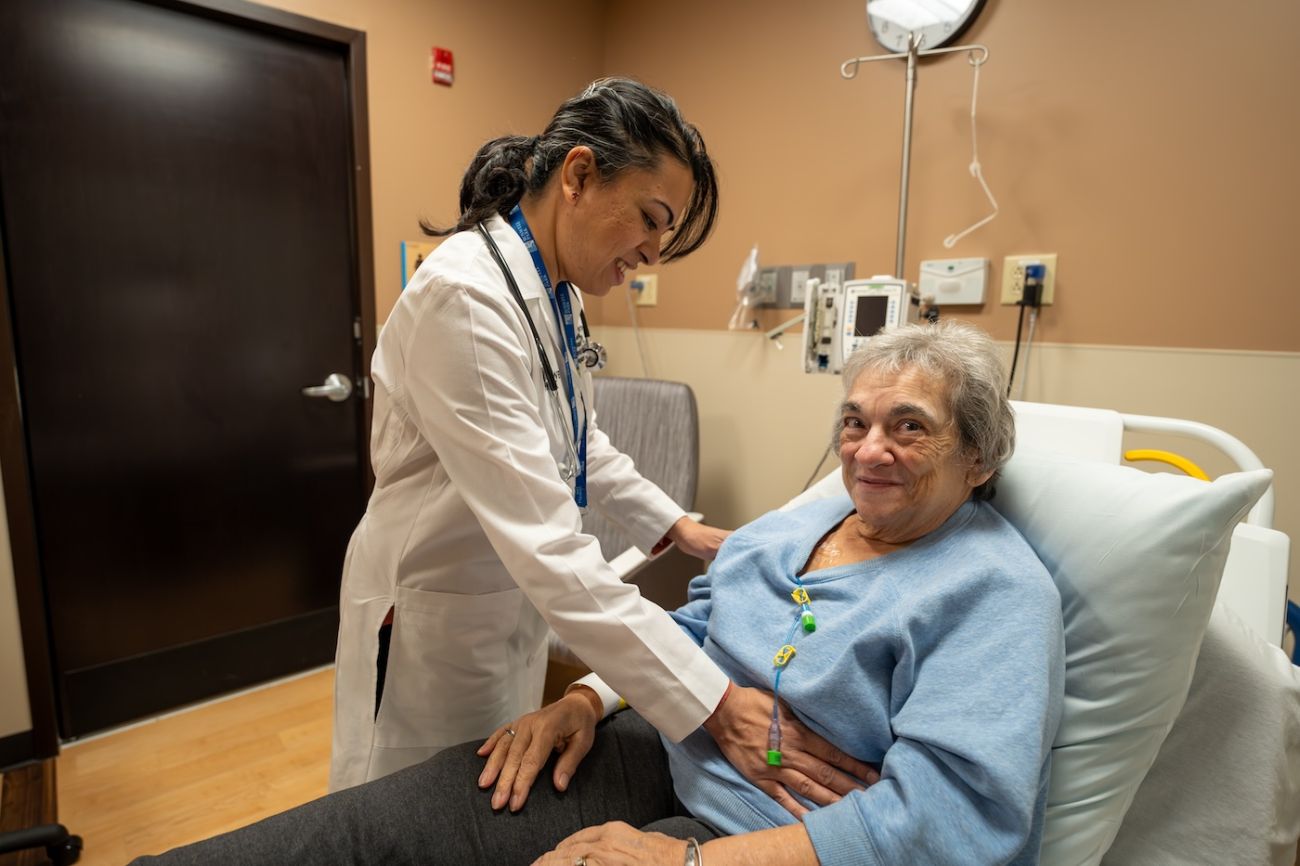Small pump delivers "regional chemotherapy" to treat metastatic disease.
For some people with cancer that has spread to the liver, or a primary cancer within the liver, a wireless metal pump about the size of a hockey puck offers bright hope for longer-term survival and a potential cure.
Hepatic artery infusion is a type of “regional chemotherapy” that uses a small pump to deliver and control chemotherapy to the liver so the drugs don’t need to circulate throughout the body. This approach allows your physician to use higher doses of chemotherapy drugs to treat your cancer without causing the usual toxicity or side effects.
“Chemotherapy delivered directly to the liver with hepatic arterial infusion pump is most often used for colorectal cancer that has spread to the liver as stage 4 disease, although we also use it in cases of cholangiocarcinoma, or bile duct cancer,” explains Leonid Cherkassky, MD, a surgical oncologist at Roswell Park Comprehensive Cancer Center.
How hepatic artery infusion works
The wireless pump is surgically placed inside the abdominal wall, sometimes with robotic surgery, and a small tube (catheter) is inserted into the blood vessel that connects to the hepatic artery, the major blood vessel that carries blood to the liver.
“We know that the blood supply to metastatic colorectal cancer and bile duct cancers is primarily through the arteries, so we insert the pump directly into the liver artery to get the optimal delivery of the drug,” Dr. Cherkassky says.
“This allows your doctors to continuously deliver and monitor a powerful dose of chemotherapy straight to the liver and provide a liver-directed treatment option for patients with high-risk liver tumors who are not able undergo surgery. For these patients, treatment directed to the liver can be life-prolonging and, in some cases, can achieve a cure.”
Hepatic artery infusion is often used in combination with surgery and other traditional chemotherapy. The duration of the therapy will depend on how well the patient's disease responds to the treatment, but it can last for up to two years. The therapy helps to reduce tumor size and may be beneficial in these situations:
- When the spread of cancer to the liver is too extensive and tumors are too complex to allow for immediate surgery, or
- After surgery, to prevent any small remaining cancer cells from growing into tumors.
“Hepatic arterial infusion therapy is able to decrease the size of tumors so significantly that we can then perform surgery and make someone cancer-free,” Dr. Cherkassky says. “This treatment significantly increases the number of long-term cancer survivors and increases the rate of cure."
Get a second opinion with our experts
A second opinion could open the door to newer treatment options for your unique cancer.
Who can receive liver pump therapy?
“Eligibility for hepatic arterial infusion therapy depends on the volume of disease burden and if the patient is in good enough physical shape to tolerate the surgery to implant the device,” explains medical oncologist Anuradha Krishnamurthy, MD, of Roswell Park.
Your cancer care team may recommend hepatic artery infusion therapy for you if you have:
- colorectal liver metastases that cannot be effectively treated with surgery.
- minimal disease outside of the liver and primary tumor.
- a high risk for recurrence of your liver cancer.
- intrahepatic cholangiocarcinoma (cancer of the bile ducts that are located within the liver).
First used 10 to 15 years ago, hepatic artery infusion is approved as a standard of cancer care under the guidelines of the National Comprehensive Cancer Network (NCCN). Roswell Park is among the few regional providers that offers this kind of treatment.
“There are many different ways to treat colorectal cancer. Patients should have information on all treatments that are available to them,” says Dr. Krishnamurthy.
“Roswell Park is one of the only institutions in the area that provides hepatic arterial infusion. In Western New York this is the only facility. The next closest facility is in Pittsburgh.”
Why Roswell Park for cancer in the liver?
The most common type of cancer in the liver is colorectal cancer that has spread to the liver, followed by cancers originating in the liver – either bile duct cancer or liver cell cancer.
“Not all of these cancers are common, but they are very common at Roswell Park,” says Dr. Cherkassky.
“Our multidisciplinary teams have extensive experience treating all of these types of cancers in the liver. We often see patients seeking second opinions, and because of our experience and range of treatment options, including hepatic artery infusion, we are able to offer patients a better treatment plan that maximizes the length and quality of their lives.”




